初一情态动词的讲解与练习
(完整word版)初一情态动词用法讲解及练习册
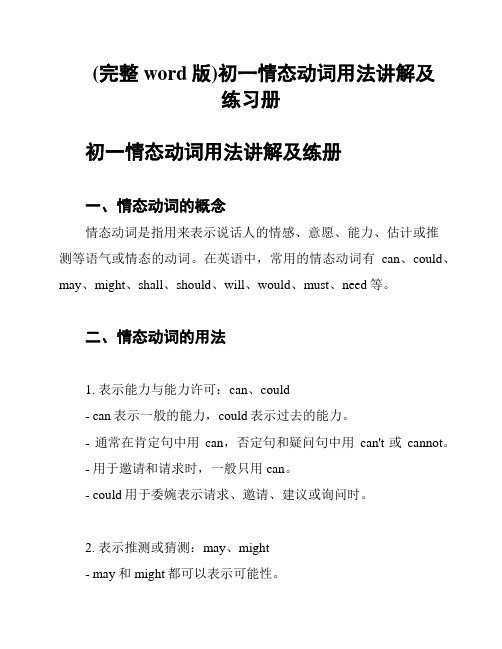
(完整word版)初一情态动词用法讲解及练习册初一情态动词用法讲解及练册一、情态动词的概念情态动词是指用来表示说话人的情感、意愿、能力、估计或推测等语气或情态的动词。
在英语中,常用的情态动词有can、could、may、might、shall、should、will、would、must、need等。
二、情态动词的用法1. 表示能力与能力许可:can、could- can表示一般的能力,could表示过去的能力。
- 通常在肯定句中用can,否定句和疑问句中用can't或cannot。
- 用于邀请和请求时,一般只用can。
- could用于委婉表示请求、邀请、建议或询问时。
2. 表示推测或猜测:may、might- may和might都可以表示可能性。
- may常用于肯定句,might常用于疑问句或否定句。
3. 表示义务或必要性:must、have to、need to- must表示说话人的主观判断,have to表示客观上的必须。
- need to表示需要,用于肯定句。
4. 表示意愿、请求或建议:shall、should、will、would- shall用于疑问句中提出请求或建议。
- should用于陈述句中表示建议或意愿,也可以用于疑问句中。
- will表示意愿,would表示过去经常这样做或愿意做。
- would可以用于表示客气的请求。
三、情态动词的练请根据下列句子,根据语境填入适当的情态动词:1. Can you help me with this homework, please? I _________really appreciate it.3. The weather is getting warmer. It _________ rain later.4. I'm not sure if I _________ make it to the party. I might have other plans.5. _________ you like to have dinner with me tonight?6. You _________ go to bed early, or you'll be tired tomorrow.答案:1. would2. must3. may4. can5. Would6. should7. would以上是关于初一情态动词用法的讲解及练习册。
初一情态动词讲解及练习

初一情态动词讲解及练习may, might, must, should, need, had better等含义:表示说话人对所述动作的看法,如需要、可能、意愿或怀疑等。
1、用法特点:⑴ 它们必须与其他动词连用,即:肯定:情态动词+动词原形:He can swim、否定:情态动词+not+动词原形:He can not(can’t)swim、一般疑问句:把情态动词提前:Can he swim?Yes,he can、/No,he can’t、表示说话人对所述动作的看法,如需要、可能、意愿或怀疑等。
⑵情态动词没有人称和数的变化,即第三人称单数不加-s,有些情态动词有时态的变化⑶ 在意义上,情态动词具有“多义性”。
例:can既可表示能力,又可表示可能、允许等意义。
2、各情态动词的用法(1)can:表能力,“能,会”;表可能,猜测,通常用于否定句和疑问句中,This boat can’t be hers, hers is black、(2)could:表can的过去式;表请求允许,比can更委婉地提出请求。
(3)May: 表猜测,“可能”(只能用于肯定句,否定句用can’t)表征求同意,May I come in? (4)Might: may的过去式;might比may更加委婉。
(5)Must: 表义务的“必须” 表事情的必要性和重要性。
Y ou must take care of your parents、表推测的“一定,准是”(只有肯定猜测,否定猜测用can’t) The lady must be a doctor、(6)Should: 表义务或责任“应该”。
(7)Need: 表必要性。
(8)Would: will的过去式;表示意愿或用于第二人称的疑问句中,表礼貌委婉的请求,比can更委婉。
(9)Had netter: 最好,(had better not)3、易混的情态动词(1)Can/ could 与be able to: 表“能力”时 can只有现在和过去时两种时态,其余时态用beable to, can指与生俱来的能力,be able to后天形成的能力。
助动词与情态动词讲解及练习题
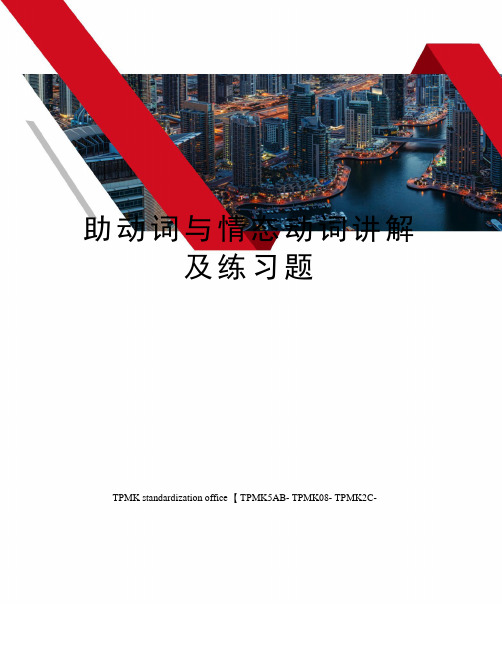
助动词与情态动词讲解及练习题TPMK standardization office【 TPMK5AB- TPMK08- TPMK2C-助动词与情态动词一、助动词助动词有be, have, do, will, shall。
它们本身没有词义,只和实义动词的一定形式构成复合谓语,用来表示时态和语态,构成否定、疑问及加强语气等。
1、be (am, is, are, were, been)(l)“be + -ing”构成进行时态;(2)“be + 过去分词”构成被动语态;(3)“be + 动词不定式”构成复合谓语:①表按计划安排要发生的事。
The prime minister is to visit Japan next year.总理将于明年访问日本。
②用于命令。
You're to do your homework before you watch TV.你得做完了作业才能看电视。
2、have (has, had)(1)“have+过去分词”构成完成时态。
如:Have you seen the film(2)“have been + -ing”构成完成进行时态。
如:What have you been doing these days 这些日子你一直在干什么?3、do (does, did)(1)“do not + 动词原形”构成行为动词的否定式。
如:His brotherdoesn’t like playing basket.;(2)“Do + 主语 + 动词原形”构成行为动词的一般疑问句。
Does he go toschool by bike every day (3)“do + 动词原形”用于祈使句或陈述句中表示加强语气。
如:I did go to see him, but he wasn’t in我确实去看望他了,但他不在家。
Do do some work. 请一定做点什么;(4)代替前面刚出现的动词以避免重复。
中考初中语法祈使句情态动词专题讲解与练习

中考初中语法祈使句情态动词专题讲解与练习情态动词一.情态动词can_________________ can’t_____________________May_________________ may not______________________Must______________ mustn’t_______________________二、情态动词的特点1. 情态动词无人称和数的变化,2. 情态动词后面跟的动词需用原形,否定式构成是在情态动词后面加 "not"。
3. 个别情态动词有过去式, 过去式用来表达更客气, 委婉的语气, 时态性不强, 可用于过去,现在。
三、情态动词的用法1. can/could;can’t/couldn’t (否定)1) 表示能力, 意为“能、会”, 例如:I can speak a little English. -- Can you ride a bike?I can’t swim. -- Yes, I can. / No, I can’t.2) 表示请求或允许,多用于口语中,意为“可以、能”等You can go home now. 现在你可以回家了 -- Can I borrow your bike?You can’t stop your car here. -- Yes, you can. / No, you can’t.3) 用于否定句、疑问句中,表示猜测、怀疑或不肯定.Lucy can’t be at home now, she went to the park just now.Where can it be? I can’t find my football.【注意:】1). could 是can的过去式, 有两种用法, 一种表示过去式;一种用来表达更加客气, 委婉的语气, 时态性不强, 可用于过去,现在。
2). be able to 意为“有能力,能够做...”, 相当于can/could, 但它有人称,数和时态的变化。
初中英语情态动词专项语法讲解
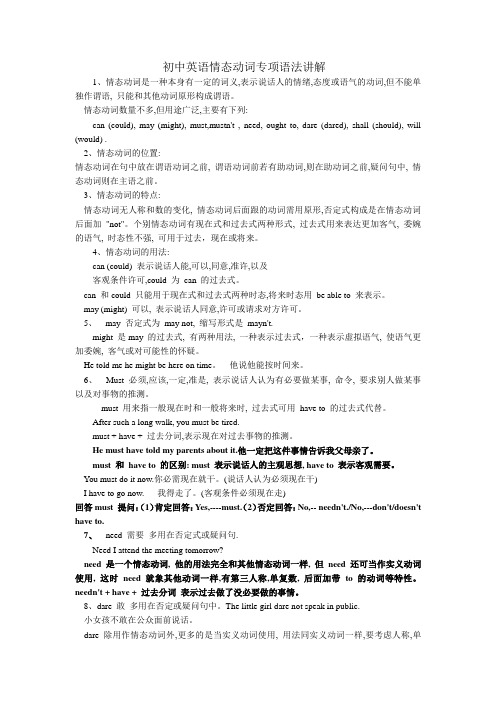
初中英语情态动词专项语法讲解1、情态动词是一种本身有一定的词义,表示说话人的情绪,态度或语气的动词,但不能单独作谓语, 只能和其他动词原形构成谓语。
情态动词数量不多,但用途广泛,主要有下列:can (could), may (might), must,mustn't , need, ought to, dare (dared), shall (should), will (would) .2、情态动词的位置:情态动词在句中放在谓语动词之前, 谓语动词前若有助动词,则在助动词之前,疑问句中, 情态动词则在主语之前。
3、情态动词的特点:情态动词无人称和数的变化, 情态动词后面跟的动词需用原形,否定式构成是在情态动词后面加"not"。
个别情态动词有现在式和过去式两种形式, 过去式用来表达更加客气, 委婉的语气, 时态性不强, 可用于过去,现在或将来。
4、情态动词的用法:can (could) 表示说话人能,可以,同意,准许,以及客观条件许可,could 为can 的过去式。
can 和could 只能用于现在式和过去式两种时态,将来时态用be able to 来表示。
may (might) 可以, 表示说话人同意,许可或请求对方许可。
5、may 否定式为may not, 缩写形式是mayn't.might 是may 的过去式, 有两种用法, 一种表示过去式,一种表示虚拟语气, 使语气更加委婉, 客气或对可能性的怀疑。
He told me he might be here on time。
他说他能按时间来。
6、Must 必须,应该,一定,准是, 表示说话人认为有必要做某事, 命令, 要求别人做某事以及对事物的推测。
must 用来指一般现在时和一般将来时, 过去式可用have to 的过去式代替。
After such a long walk, you must be tired.must + have + 过去分词,表示现在对过去事物的推测。
初中英语情态动词详细用法归纳(含练习及答案)
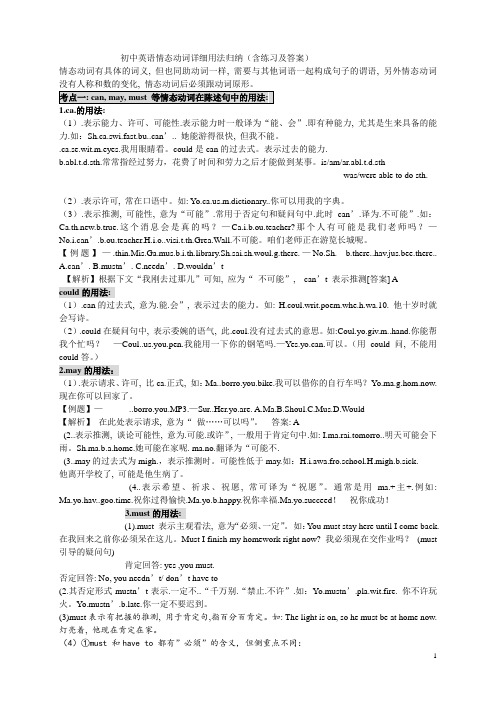
初中英语情态动词详细用法归纳(含练习及答案)情态动词有具体的词义, 但也同助动词一样, 需要与其他词语一起构成句子的谓语, 另外情态动词没有人称和数的变化, 情态动词后必须跟动词原形。
1.ca.的用法:(1).表示能力、许可、可能性.表示能力时一般译为“能、会”.即有种能力, 尤其是生来具备的能力.如:Sh.ca.swi.fast.bu..can’.. 她能游得很快, 但我不能。
.ca.se.wit.m.eyes.我用眼睛看。
could是can的过去式。
表示过去的能力.b.abl.t.d.sth.常常指经过努力,花费了时间和劳力之后才能做到某事。
is/am/ar.abl.t.d.sthwas/were able to do sth.(2).表示许可, 常在口语中。
如: .m.dictionary..你可以用我的字典。
(3).表示推测, 可能性, 意为“可能”.常用于否定句和疑问句中.此时can’.译为.不可能”.如:Ca.th.new.b.true.这个消息会是真的吗?—Ca.i.b.ou.teacher?那个人有可能是我们老师吗?—No.i.can’.b.ou.teacher.H.i.o..visi.t.th.Grea.Wall.不可能。
咱们老师正在游览长城呢。
【例题】—.thin.Mis.Ga.mus.b.i.th.library.Sh.sai.sh.woul.g.there.—No.Sh.__b.there..hav.jus.bee.there..A.can’.B.mustn’.C.needn’.D.wouldn’t【解析】根据下文“我刚去过那儿”可知, 应为“不可能”, can’t 表示推测[答案] Acould的用法:(1).can的过去式, 意为.能.会”, 表示过去的能力。
如: H.coul.writ.poem.whe.h.wa.10. 他十岁时就会写诗。
(2).could在疑问句中, 表示委婉的语气, 此.coul.没有过去式的意思。
七年级英语情态动词训练及解析含解析
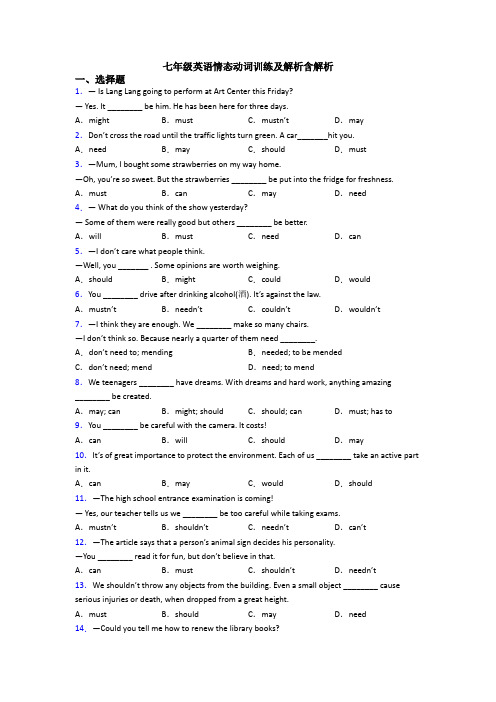
七年级英语情态动词训练及解析含解析一、选择题1.— Is Lang Lang going to perform at Art Center this Friday?— Yes. It ________ be him. He has been here for three days.A.might B.must C.mustn’t D.may2.Don’t cross the road until the traffic lights turn green. A car_______hit you.A.need B.may C.should D.must 3.—Mum, I bought some strawberries on my way home.—Oh, you’re so sweet. But the strawberries ________ be put into the fridge for freshness. A.must B.can C.may D.need4.— What do you think of the show yesterday?— Some of them were really good but others ________ be better.A.will B.must C.need D.can5.—I don’t care what people think.—Well, you _______ . Some opinions are worth weighing.A.should B.might C.could D.would6.You ________ drive after drinking alcohol(酒). It’s agai nst the law.A.mustn’t B.needn’t C.couldn’t D.wouldn’t7.—I think they are enough. We ________ make so many chairs.—I don’t think so. Because nearly a quarter of them need ________.A.don’t need to; mending B.needed; to be mendedC.don’t need; mend D.need; to mend8.We teenagers ________ have dreams. With dreams and hard work, anything amazing________ be created.A.may; can B.might; should C.should; can D.must; has to 9.You ________ be careful with the camera. It costs!A.can B.will C.should D.may10.It’s of great importance to protect the environment. Each of us ________ take an active part in it.A.can B.may C.would D.should 11.—The high school entrance examination is coming!— Yes, our teacher tells us we ________ be too careful while taking exams.A.mu stn’t B.shouldn’t C.needn’t D.can’t12.—The article says that a person’s animal sign decides his personality.—You ________ read it for fun, but don’t believe in that.A.can B.must C.shouldn’t D.needn’t13.We shouldn’t throw any objects from the building. Even a small object ________ cause serious injuries or death, when dropped from a great height.A.must B.should C.may D.need 14.—Could you tell me how to renew the library books?—With pleasure. You ________ come to our desk every time. It’s easier to rene w them online. A.can’t B.mustn’t C.needn’t D.shouldn’t 15.You ________ write the report again because spelling mistakes are not allowed at all. A.must B.can C.may D.could16.— Mom, must I clean my room now?— No, you ________. You can do it after dinner.A.needn’t B.mustn’t C.shouldn’t D.can’t17.A lot of online resources ________ be used either by teachers at school or parents at home. A.can B.should C.need D.must18.If you buy your mum an iRobot floor cleaner, she ________ sweep the floor every day. A.can’t B.mustn’t C.needn’t D.shouldn’t19.---Will you be back early this evening?---Yes, but I ________ be a little late. Our boss sometimes has extra work for us.A.may B.must C.need D.will 20.—Amy, I hear you've got many foreign coins._______ I have a look?—Of course, I'll fetch them for you.A.May B.MustC.Should D.Need21.—Shall we go camping this summer holiday?—Nothing________be better.A.should B.could C.must D.may 22.—Would you please________in that way? That’s not safe!—Sorry. I won’t do it any mor e.A.not driving B.not to drive C.no driving D.not drive 23.—Will your mother be at home this Saturday?—Hard to say. She _______go to the countryside to see my grandparents.A.must B.may C.can D.would 24.Think twice before making a decision, or you __________ get into trouble.A.may B.can't C.shouldn't D.mustn't 25.—There is a knock at the door.—It ________ be my mom. She always comes back home at this time.A.may B.may not C.must D.can’t26.Most young people like shopping online because they ________ spend much time going from shop to shop.A.needn’t B.can’t C.mustn’t D.shouldn’t 27.—Could I join you in the programme?—Sorry, you ________. You are too young.A.shouldn’t B.mustn’t C.can’t D.needn’t 28.Hurry up, or we ________ miss the beginning of the film.A.should B.must C.may D.have to29.— Excuse me, could you tell me where the Nanjing Brocade Museum is?—Go along this road for five minutes. You ________ miss it. It’s a huge building.A.mustn’t B.can’t C.needn’t D.shouldn’t 30.—Must the children leave at six tomorrow morning?—No, they _______. They can have more time to get ready for the trip.A.can’t B.needn’t C.mustn’t D.may not 31.—Why didn’t you tell it to me earlier?— Why ________ I? I want to have my own secret.A.can B.may C.should D.shall 32.—Mum, why do I have to wear a mask before entering the supermarket?—For your health and safety, you ________ be too careful.A.shouldn’t B.can’t C.mustn’t D.needn’t33.A hard-working man ________ become a great scientist, but a great scientist ________ be a hard-working man.A.can’t; can B.may not; must C.can’t; must D.may not; can 34.—What is that young lady’s job?—She ________ be a nurse, I’m not sure.A.must B.may C.need D.would 35.According to the rule, used batteries ________ be dropped in the red bin for harmful wastes. A.may B.would C.should D.might36.You _________ smoke here! Look at the sign. It says "No smoking".A.needn't B.mustn't C.can D.may37.—How beautiful the winter jasmines (迎春花) are!—Yes. These golden-yellow flowers ________ be widely seen in my city in March.A.must B.can C.would D.should38.—Is that Mr Zhou?—It ________ be him. He has gone to Beijing.A.can B.may C.can’t D.shouldn’t39.—Is it really necessary for me to go shopping with a mask on?—I’m afraid you ________ in public. It is not only to protect yourself but also to protect others. A.must B.should C.can D.need40.—Will Jim come to Yangzhou for a holiday?—He ________come and it depends on how much homework he will have.A.may B.should C.must D.need41.I think all the students love the weekends because, to them, they ________ get up early on Saturdays or Sundays.A.mustn’t B.don’t need C.needn’t D.can’t42.— Is the boy over there Tom? He often wears a jacket like that.— It _______ be him. He is absent from school today.A.needn’t B.shouldn’t C.mustn’t D.can’t43.You ________ pay too much attention to protecting yourself if you plan to go abroad. A.mustn’t B.can’t C.shouldn’t D.needn’t 44.When people are waiting at the zebra crossing, cars and buses ________ wait and let them go first.A.must B.may C.can D.need 45.—Shall I tell him the change of the time right now?—I’m afraid you ________, otherwise he will be late for the meeting.A.can B.may C.must D.need46.—Will dad arrive home at 6 o’clock to have dinner with us this evening?— I think he will, but he ________ not. Sometimes he works extra hours.A.can B.must C.need D.may 47.—Excuse me. I haven’t finished reading the book yet. May I keep it a bit longer?— Sorry, you ________. You must return it on time.A.needn’t B.c an’t C.won’t D.shouldn’t 48.Sometimes smiles ________ be false, hiding other feelings like anger, fear or worry. A.should B.would C.must D.can49.You’ve got an A in the maths test again. You ________ be good at it.A.can B.may C.must D.should 50.—Must I finish all my homework today, Mum?—No, you ________, my dear. You can finish some tomorrow if you like.A.needn’t B.shouldn’t C.can’t D.mustn’t【参考答案】***试卷处理标记,请不要删除一、选择题1.B解析:B【详解】句意:——这周五郎朗会去艺术中心表演吗?——是的。
初一情态动词讲解及练习附答案

(could), may (might), must, have to, shall (should, will (would), dare (dared), need (needed), ought to等。
情态动词无人称和数的变化;不能单独使用,必须与其后的动词原形构成谓语一、can, could1) 表示能力(体力、知识、技能)。
Can you lift this heavy box?(体力)Mary can speak three languages.(知识)Can you skate?(技能)此时可用be able to代替。
Can只有一般现在时和一般过去式;而be able to则有更多的时态。
I’ll not be able to come this afternoon.当表示“经过努力才得以做成功某事”时应用be able to,不能用Can。
如:He was able to go to the party yesterday evening in spite of the heavy rain.2) 表示请求和允许。
-----Can I go now? ----- Yes, you can. / No, you can’t.此时可与may互换。
在疑问句中还可用could, might代替,不是过去式,只是语气更委婉,不能用于肯定句和答语中。
---- Could I come to see you tomorrow? ---- Yes, you can. ( No, I’m afraid not. )3) 表示客观可能性(客观原因形成的能力)。
They’ve changed the timetable, so we can go by bus instead. This hall can hold 500 people at least.4) 表示推测(惊讶、怀疑、不相信的态度),用于疑问句、否定句和感叹句中。
- 1、下载文档前请自行甄别文档内容的完整性,平台不提供额外的编辑、内容补充、找答案等附加服务。
- 2、"仅部分预览"的文档,不可在线预览部分如存在完整性等问题,可反馈申请退款(可完整预览的文档不适用该条件!)。
- 3、如文档侵犯您的权益,请联系客服反馈,我们会尽快为您处理(人工客服工作时间:9:00-18:30)。
初一情态动词的讲解与练习-CAL-FENGHAI-(2020YEAR-YICAI)_JINGBIAN情态动词一、情态动词的定义:情态动词有词义,但它不能单独作谓语,它必须和其他动词一起构成谓语。
情态动词没有人称和数的变化;它的后面必须跟动词原形。
二、情态动词的种类:三、情态动词的用法及主要句型:1、Can I help you ——Yes, please. / No, thanks.2、Can + 主语 + 动词原形Yes, ~ can. No, ~can’t.3、Can I borrow your book----Yes,of course.4、Can I write on the book------No, you can’t\mustn’t.5、Could \Can you help me---- Yes,of course.\Certainly.\ Sure.6、Could \Can you tell me the way to the Zoo?7、May I come in ----- Come in, please.8、May I sit here----- Yes, please.\Sorry, please don’t.9、May I have some Coke---- Yes, of course.10、May/ Could / Can I speak to Tom -----Speaking. Who’s calling11、should 、shouldn’t 表示劝告:1) He should get up early.2) She shouldn’t play computer game too much.12、Should +主语 +动词原形Yes, ~ should.\ No, ~shouldn’t.13、表示建议“你愿意…吗”Would you like to go shopping with me-----Yes, I’d love to. /I’d love to. But I’m busy now.14、就餐用语Would you like something to eat\drink ----Yes, I’d like…15、shall用于第一人称(I, we), 可以表示“将”和表示建议“……好吗”1) Where shall we have dinner?2) Shall we go fishing-----All right. \OK. \Good idea.16、Must + 主语 + 动词原形---Yes,~ must.\No, ~needn’t.(一) 用适当的情态动词填空。
1. Must I borrow the book with my ID cardNo, you ________.2. ________ I use your carYes, you ________.3. ________ I go home nowNo, you _________ stay here.4. My mother is ill. I _________ stay at home and look after her.5. ________ you like some tea?6. You ________ take more exercise.7. ________ you tell me how to get to the Qingyun Park?8. The clock ________ tell us the time.9. ________ you like to go fishing with me?10. ________ we play football this afternoon?(二) 按要求改写句子。
1. I can run fast.I ________ ________ fast. (否定句)2. You must return the book now.(一般疑问句)________ I return the book nowNo, you ________.3. He can play basketball well. (一般疑问句)_______ he ______ basketball well?4. They must take the books out of the room. (否定句)They ________ ________ the books out of the room.5. He should get up early. (否定句)He _______ get up late.(三) 单项选择。
()1. you like some milkA . Would B. Could C . Can()2. We pick the flower in the park. A. can’t B. don't C. mustn’t ( ) 3.W e should more trees, and we shouldn’t cut any trees.A. plantB. plantingC. plants( ) 4.May I have some coffee?A.Yes,you have.B. Yes,you can.C. Yes,certainly.( ) 5.Shall we visit the factory?A.Yes,we do.B.Yes, we shall. B.All right.( ) 6.Would you like something to eat?A.Yes,we would.B.Yes, I’d like some cakes.C.Yes, of course.( ) 7.What can I do for you?A.Yes,you can.B.No,I can do it.C. Yes.I’d like some orange s.一.翻译下列单词。
不会______________ 不必______________应该_________________ 必须_________________将,要_________________ 不愿_________________需要_________________ 会,能_________________二、按照要求改写句子三、1. Daniel must watch TV every evening.(改为否定句)四、___________________________________________________五、2. I can’t do my homework every day.(改为肯定句)六、_______________________________________________________ _七、3. You’ll need your book and pen..(改为否定句)八、_______________________________________________________九、4.We shall like playing computer games.(翻译句子)十、_______________________________________________________ _十一、5. She should go to school every morning.(改为否定句)十二、_____________________________________________________ __十三、6. He may speak English very well.(翻译句子)十四、_____________________________________________________ _____十五、7. I needn’t take photos in the park.(改为肯定句)十六、_____________________________________________________ ___8. John may come from London.(翻译句子)___________________________________________________9. Would you like to drink coffee?(肯定回答)________________________________________________________10. Simon and Daniel would like going skating.(改为否定句)___________________________________________________三、翻译下列句子妈妈不会游泳。
(can’t)________________________________________________________________它可能是电池(may)________________________________________________________________我能照顾我的奶奶(can)________________________________________________________________ Mary不应该取笑Joe.(should’t)________________________________________________________________爸爸将去度假。
(would)________________________________________________________________ Jack必须锻炼身体(must)________________________________________________________________她不必离开(needn’t)___________________________________________________________。
